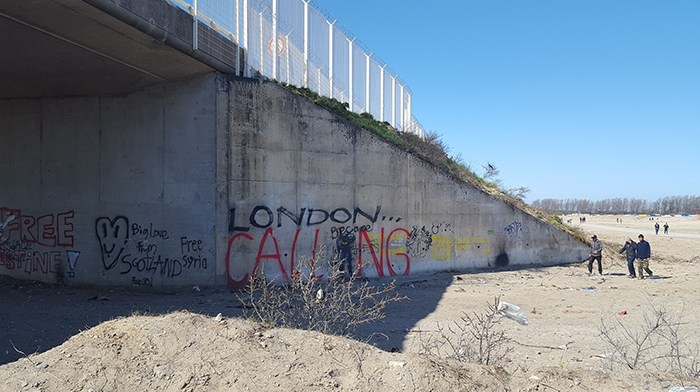Borders and camps
The current 'refugee crisis' in Europe and the heated debate over spatiality's of migrations and its control.

14 February 2017
Overview
The current 'refugee crisis' in Europe and the heated debate over spatiality's of migrations and its control
Border and camp studies have recently attracted a great deal of international attention: researches and publications have proliferated, shaping a very extensive body of knowledge. The arguments in connection with borders and camps are far from being exhausted. Nevertheless, there is the need to (re)organise the wealthy of knowledge produced so far, in order to gain a holistic vision of what has been produced, what are the unexplored areas, to better situate the future research against the background of the state of art.
Building on a review of the existing literature, as well as on primary data from Calais and Dunkirk, and reflections emerged during a public debate around Space, politics and imperfect citizenship, the research aims to consolidate and advance the work and research on borders and camps that has been developed at DPU so far.
The research is supported by the urban transformations and the diversity, social complexity & planned intervention research clusters
The team: Camillo Boano, Giovanna Astolfo, Ricardo Martén, Irit Katz (research associate from the Department of Architecture, University of Cambridge), Akil Scafe-Smith (architecture student at The Bartlett)
Field Notes
Makeshift camps, created in various and dynamically changing locations across Europe (near and within cities, ports, forests, borders), have become an integral part of the so-called current refugee crisis. Amongst these, the Jungle refugee camp in Calais, northern France, has become an internationally recognized hotspot, attracting media attention due to its proximity to the Eurotunnel and the conflictive relations between the refugees and the French authorities. These reached a climax at the beginning of this year, with brutal evictions, the bulldozing of nearly half the camp, and multiple legal confrontations between the local prefecture and the organisations cooperating and resisting in place (NGOs, volunteers, activists).
As part of the research on Borders and camp, we visited Calais and Dunkirk in April and met representatives of several organisations actively running and operating different activities in the Jungle and Grande-Synthe. These included members from l'Auberge des Migrants, Help Refugees, Care for Calais, La Vie Active and Médecins Sans Frontières. We are grateful for the workers and activists of these organizations for dedicating us part of their limited time and for sharing their experiences with admirable honesty and introspection, from which we have gained invaluable insights.
The humanitarian interventions in Calais and Dunkirk have shown alternative methods in dealing and leading the response, highlighting the need for discussions about possible approaches that planners, architects, activists and academics could adopt. It also puts to the forefront issues about urban transformation, assimilation and policy that are needed in order to propose sustainable solutions. This collaborative preliminary step between DPU in partnership with Cambridge University and others civil society groups, aims to set a possible action-research agenda around the complex territory of camp-city and the manifold dimensions of cosmopolitanism, refuge and migration. The next step will be public event to be held in June, to discuss some findings and hear other voices with relevant experiences and perspectives.
- Video
Borders/ Camps
Out of the preliminary visit in April 2016, which included an exploration of the camps as well as detailed conversations with the aforementioned groups, several elements emerged that will inform our research agenda and future development. The first is the understanding of the continental scale of the current migratory wave. The camps we visited in Calais and Grande-Synthe are not isolated camp realities but rather part of a fast evolving geography of heterogeneous camps spanning across European borders. Second, the heterogeneity of the multiple practices of humanitarian aid in place, ranging from small activist groups to international professional organizations, with different strategies and levels of specialisation.
The video 'Borders / Camps' produced by Ricardo Marten below is one of the outputs from the initial visit to Calais and Dunkirk
(7'', directed by Ricardo Marten, April 2016, Calais and Dunkirk)
- Notes
Blog - Life at the edge: reflecting on Calais, borders and camps
By Ricardo Marten
Borders & camps. Setting an initial research agenda
By Giovanna Astolfo
Seeing the city anew: Designing for refugee integration
Edited by Giovanna Astolfo and Kay Pallaris
This years BUDDcamp explored the work of the SPRAR programme, led by the Local Democracy Agency (LDA) Zavidovici in Brescia. The programme works with refugees, assisting them to achieve progressive autonomy, as they integrate and adapt to a new city. Students explored how the city’s design and urban planning processes can help to hinder or facilitate integration. Student’s present their findings, offering a personal journey towards understanding their role as an urban practitioner in designing for social-spatial justice.
Space, politics and imperfect citizenship. A debate on migration policy and forms of life at the edge of Europe.
With an increase in forced migration, territorial tensions have risen across Europe, altering political and spatial discourses. A fast evolving geography of unregulated and partially regulated camps has become a phenomenon grounded inside and around the edges and borders of the continent. With refugees becoming integral to debates around human rights, citizenship and biopolitics, the territorial and extraterritorial borders of Europe stand as heightened regions of contest. This debate is centred around the territorial implications currently at play, particularly the space and politics behind European migration policies and treaties, the humanitarian/activist response to the migratory wave, and the larger implications on the formation of camps as an increasingly recurrent spatial solution.
Speakers and discussants:
Nando Sigona (Institute for Research into Superdiversity, University of Birmingham);
Irit Katz (Centre for Urban Conflicts Research, University of Cambridge);
Dan Ellis (CamCRAG);
Isabelle Risso-Gill (Save the Children);
Giovanna Astolfo (Teaching Fellow, DPU);
Ricardo Marten Caceres (PhD researcher, DPU).
Chaired by Camillo Boano (DPU).
Video
The politics of the 'refugee crisis': Four renderings - Nando Signora
from Space, politics and imperfect citizenship. (30'')
 Close
Close

